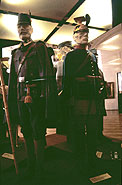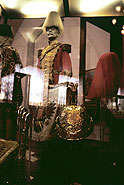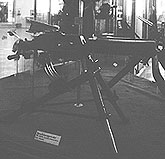



The first hall on the ground floor of the museum beyond the gift shop is devoted to the military in the time of Franz Joseph (1848-1916). It contains an array of uniforms ranging from the practical and drab infantry garb to the flamboyant ceremonial uniforms of imperial guards. In looking at such items as the ceremonial uniform of the Royal Hungarian Guards in the early 20th century we are reminded that the Habsburg rulers were also Kings of Hungary and Princes of Transylvania. Thus the guard uniforms incorporate elements of Hungarian national costume. Plumes and gilded helmets were not the essence of warfare in the late nineteenth and early twentieth centuries when technical innovation such as this machine gun designed by Schwarzlose in 1907 was making warfare increasingly lethal.
It was during this period that the empire became ever more deeply enmeshed in the spiderweb of Balkan politics, thanks to its territories in Bosnia and Herzegovina. The growing aspirations of its Balkan subjects were not being adequately addressed, and the tensions amongst the various Balkan states that had gained their independence in the nineteenth century were heightened by a network of alliances with the Great Powers. A small spark in the Balkans could set off a larger European conflagration.
This is exactly what happened with the assassination of Archduke Franz Ferdinand at Sarajevo in June 1914. The Habsburgs blamed Serbia, sent an ultimatum, and Serbia called on its ally, Russia. The competing alliance systems which divided Europe then came into play, with Germany, the Austro-Hungarian Empire and the Ottoman Empire fighting Russia, Serbia, Britain, France, and later the United States. One can argue, of course, that some other event might have precipitated this war, but the fact remains that the event memorialized in the Sarajevo exhibit was the immediate catalyst for one of the most catastrophic wars of modern times.
Given the emphasis in the exhibits on military progress and advanced technology, we might be left wondering why the result of the "Great War" as it came to be known was defeat for the Austrians and the dissolution of their Empire.